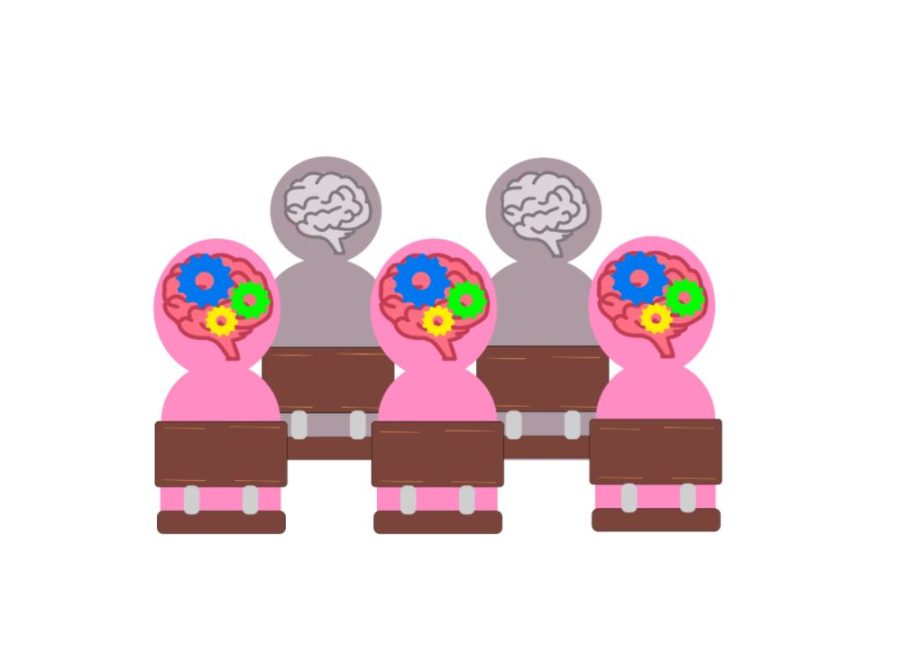It is okay to be absent for your mental health
Graphic illustration by Elizabeth Cheng
Breaks are important for students to focus during class and not be mentally absent.
November 9, 2021
Many students experience running on only a few hours of sleep, bubbling with anxiety and dealing with the constant stress that comes with being a teenager. Left unaddressed, these issues can lead to mental burnouts. Unfortunately, health issues have been stigmatized to a point where students feel uncomfortable talking about their struggles or taking absences to recover. Lynbrook and other schools should promote student dialogue that challenges school-inspired stress and the hardships of being a student.
In a recent Homeroom student survey conducted on Oct. 19, more than 50% of students agreed that school has been harder than expected, around 80% of students agreed or strongly agreed that it has been more challenging to focus on school related tasks and 49% of students have felt their mental health worsen. These statistics are concerning as they show that an overwhelming number of Lynbrook students are struggling with their mental health.
“Students think taking a break or asking for help makes them look weak, or they believe what is a mental health struggle is just them being lazy,” Lynbrook school-based therapist Jenna Starnes said.
Unfortunately, students are often afraid to ask for help from teachers because they fear that teachers might doubt the validity of their struggle. If schools help students become more comfortable with taking care of their mental health, students would have an easier time asking for help.
“Stigmatizing mental health produces self-doubt, which means students are less likely to go and talk to a teacher to say, ‘I’m completely overwhelmed and I just mentally am not in this space’ because they believe it may be their fault,” Starnes said.
Some teachers assign an overwhelming amount of assignments, which negatively affects students’ mental health and can reduce their ability to perform well in school. Many students are pressured by their parents to maintain good grades, take challenging classes and keep up with demanding extracurricular activities that can further cause fatigue. Parents also may not believe in the detrimental effects of stress or mental health issues caused by schoolwork, which causes them to believe that their students are overreacting.
Some teachers try to relieve stress for students by excusing them from certain assignments to lighten students’ workload, a potential solution that should be offered more widely by teachers. For example, art teacher Matthew Reynolds offers his students a Day of Peace Token that allows students to opt out of class once each semester. He was given this option as a student during his credential program and found it helpful.
“We all have days when things don’t go right, you’re exhausted or you have something that is affecting your ability to concentrate or work,” Reynolds said. “In those moments, it’s important to be able to say, ‘I really need a break, and I need to not do this now.’”
At times, students feel like some teachers don’t pay enough attention to how large volumes of schoolwork affects students’ mental health.
“Most of the time, teachers expect us to have time to study for their tests and everything while still giving us homework,” junior Patricia Chang said. “I have to push myself to keep studying, especially with a big test the next day, and it really affects your mental health.”
The stigma behind improving mental health makes those who are struggling with theirs less willing to take care of themselves or reach out and talk to someone. This problem is compounded at Lynbrook because many students are constantly competing against each other and are desperate to earn perfect grades.
“The culture here at Lynbrook is one of excellence, which I appreciate,” Reynolds said. “To that end, I think sometimes that mental health takes a backseat to this pursuit.”
Students experience mental burnout due to a multitude of factors: the amount of work they receive, pressure from parents and extracurricular activities. Schools can take more action to destigmatize mental health issues to improve students’ abilities to focus in class and foster healthier lifestyles. This starts by permitting and normalizing the act of students taking time off from school to work on themselves.




























































